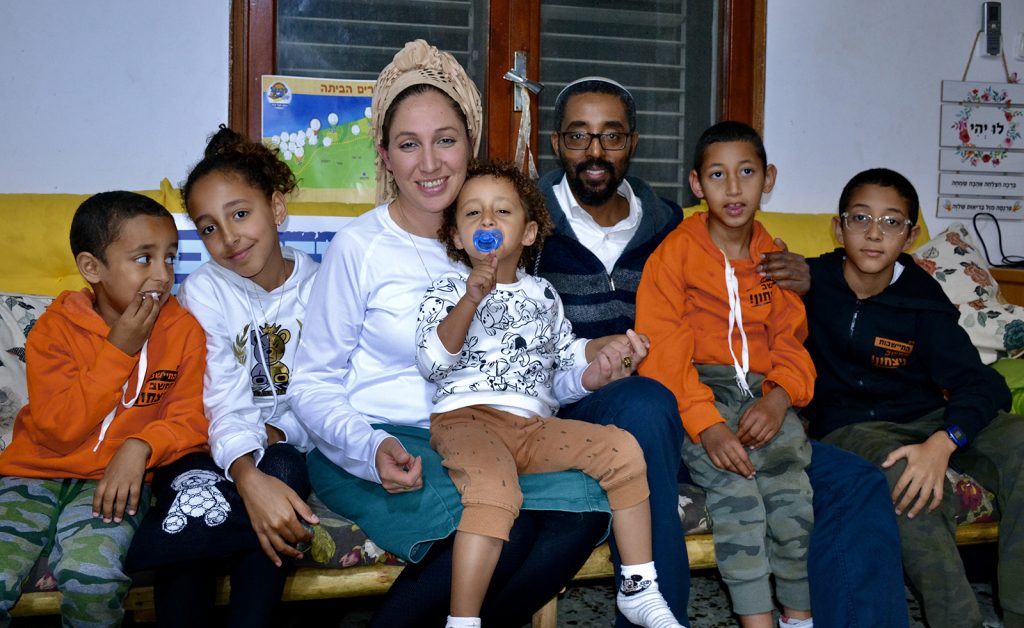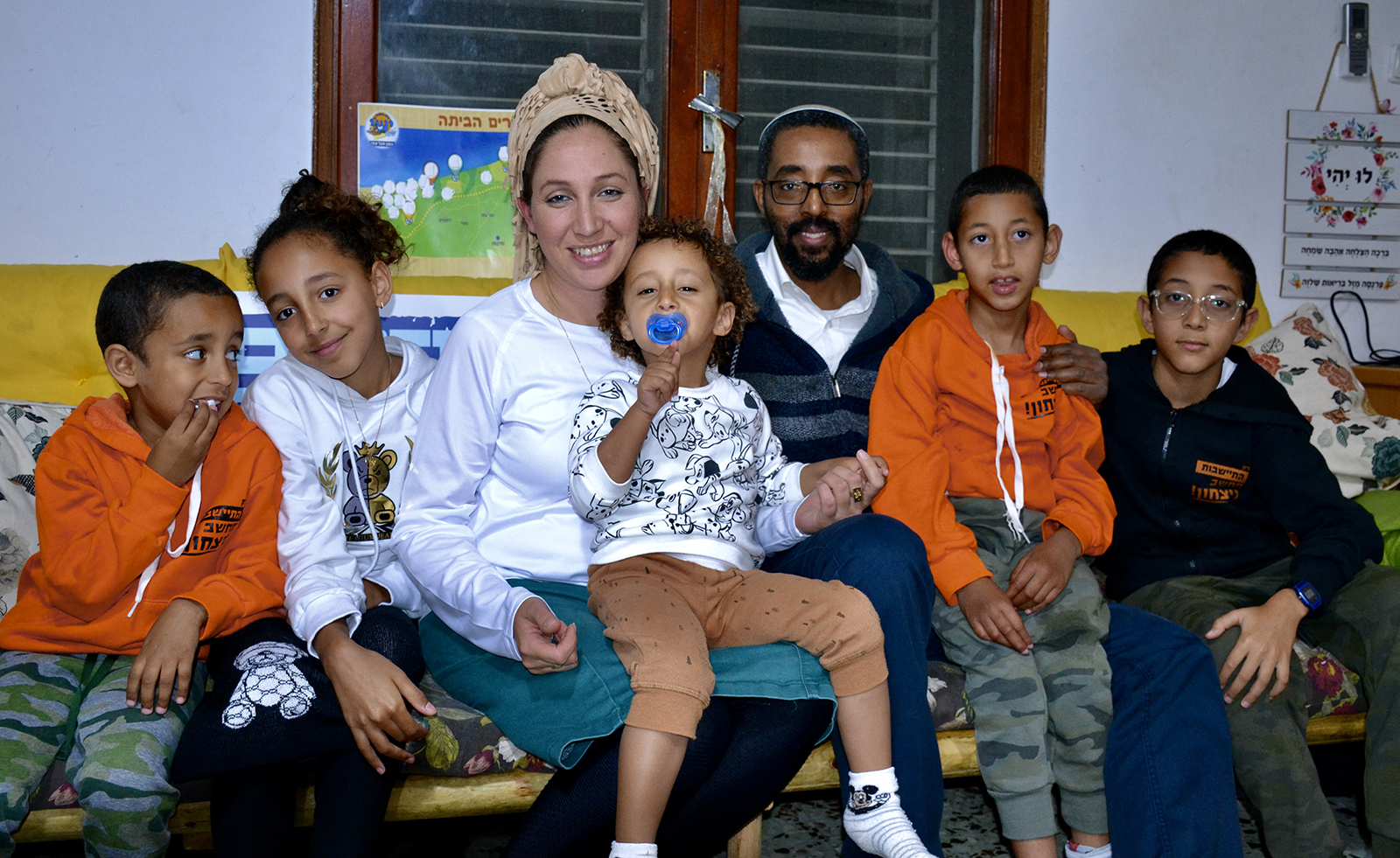
Chaya Ediger, center left, and husband Erez Ediger, center right, with their children at their home in the village of Yishi, Israel. (Photo by Reza Green)
JERUSALEM (RNS) — As her five children crowd around her, demanding attention, Chaya Ediger, a 35-year-old primary school teacher, makes a sweeping gesture indicating the comforts of her book-filled home in Yishi, a village between Jerusalem and Tel Aviv. “I’m ready to leave all these comforts and settle in Gaza,” she said. Her claim is backed up by her long-sleeve T-shirt, which reads, “Gaza is part of the Land of Israel.”
“I will live in a tent without sewage or electricity to fulfill the mitzvah of settling the land of Israel,” she said.
On the sofa nearby sat Avishai Bar Yehuda, 67, a retired administrator and entrepreneur who lives in the Israeli coastal city of Ashkelon after being forcibly evicted from a settlement in Gaza two decades ago. “After they expelled me from my home,” he said gruffly, “I knew we would return someday. The war in Gaza has given the privilege to return to Gaza, and so we must. We must restore the sanctity and security of the Jewish people.”
Ediger and Bar Yehuda, with their spouses, have signed declarations of intent to move to the Gaza Strip. Altogether, more than 600 families have vowed to establish at least five new settlements, including an urban settlement in Gaza City, according to Nachala, a movement dedicated to promoting the project.
They bring up different reasons for signing: religious and historical imperatives to live in the land promised by God in biblical times; security justifications, arguing that a Jewish presence in Gaza is a necessary protection against future Hamas attacks. Others feel a deep sense of injustice since then-Prime Minister Ariel Sharon withdrew Israel’s troops from Gaza in 2005 and ordered Israeli citizens out as well — the “expulsion,” according to the settlers. Since then Gaza has been strictly off-limits to Israelis.

FILE – Israeli Jewish settlers march holding flags and two of them carrying Torah scrolls as they leave for the last time the Jewish settlement of Netzarim in the Gaza Strip, the last Gaza settlement to be evacuated on Aug. 22, 2005. (AP Photo/Ariel Schalit, File)
But in February, a few young Israelis tried to land on Gaza’s seashore, and in March settlement supporters briefly sent their children through military lines to play inside the buffer zone near the Gaza border. Both groups were turned back by Israeli forces, though Ediger and Bar Yehuda imply that activists will soon make another settlement attempt.
Ever since the 2005 withdrawal, the Nachala movement has made an effort to keep a return to Gaza on the public agenda. The attack on Oct. 7 and Israel’s subsequent war in the Gaza Strip, along with the powerful positions of ultranationalist groups in Prime Minister Benjamin Netanyahu’s coalition, have created, in Bar Yehuda’s words, an opening and an imperative for the activists.
The return-to-Gaza movement was formally launched in late January 2024 at a convention hall in Jerusalem. Organizers say some 5,000 people attended, including 11 Cabinet ministers and 15 Knesset members, several of them members of Netanyahu’s Likud party.
Under banners reading “Conference for the Victory of Israel — Settlement Brings Security: Returning to the Gaza Strip and Northern Samaria,” organizers handed out maps of prospective settlements and flyers about the Jewish right to settle in Gaza, complete with QR codes to facilitate contributions. (Northern Samaria, a region northeast of Tel Aviv, is another area where Israeli settlers have begun to move.)
While politicians and activists, including rabbis and family members of soldiers currently fighting in Gaza, gave rousing speeches about security and Jewish sovereignty, teenage boys, who seemed to be the majority, danced in ecstatic frenzy. The crowd applauded wildly when film clips of the destruction in Gaza, with arrows indicating areas “cleared” for settlement, appeared and a booming soundtrack played old Israeli patriotic anthems.
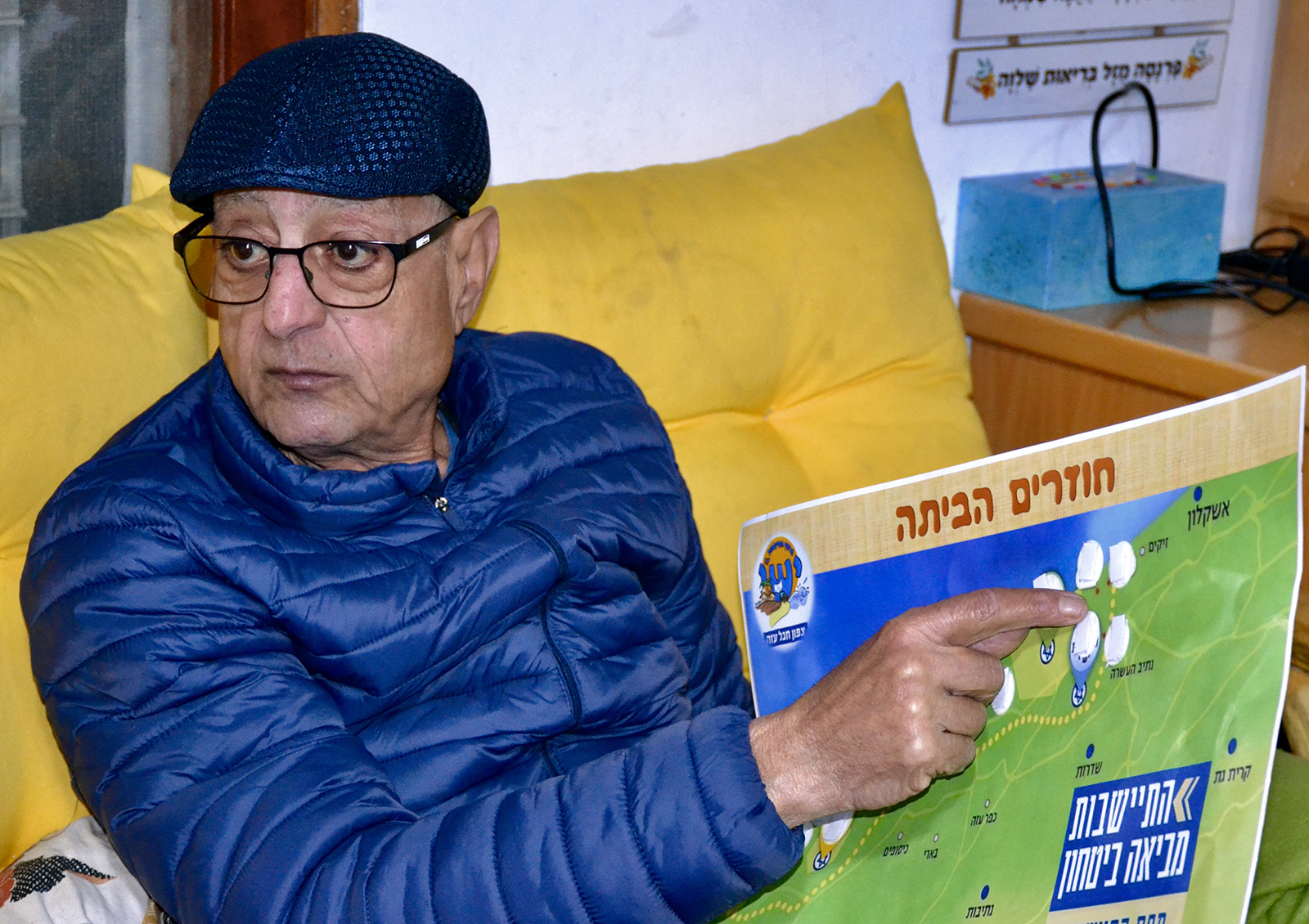
Avishai Bar Yehuda shows a map of proposed new settlements in the Gaza Strip. (Photo by Reza Green)
According to the National Library of Israel, a prosperous Jewish presence in Gaza dates back to 200 C.E. After World War I, however, the community had dwindled to several hundred. In 1929, murderous riots broke out as part of the growing Arab nationalist awakening, and all of the Jews were evacuated from Gaza, putting an end to Jewish life there.
To Ediger, this history shows Jews have a right to settle there. She says fervently as she peels an orange to serve to her children, “Gaza was once Jewish and must be again. Many in my family were murdered in the Holocaust, and never had the privilege of settling the land of Israel. And it is a miracle that now, our generation does have the opportunity and the responsibility.”
Her husband, Erez, 40, an electronic engineer who now cares full time for their disabled son, was born in Ethiopia and came to Israel as a child. “We have always believed that, as Jews, our mission is to be a light unto the nations, to make our world a better place,” he said. “This is what God wants us to do. This is what will bring redemption to the world.”
Margalit Bar Yehuda, Avishai’s wife, said: “Arabs from Gaza cruelly and brutally murdered more than 1,200 people on Oct. 7. I am going to settle in these victims’ memory, so that the world will know that this cannot and will not happen again.”
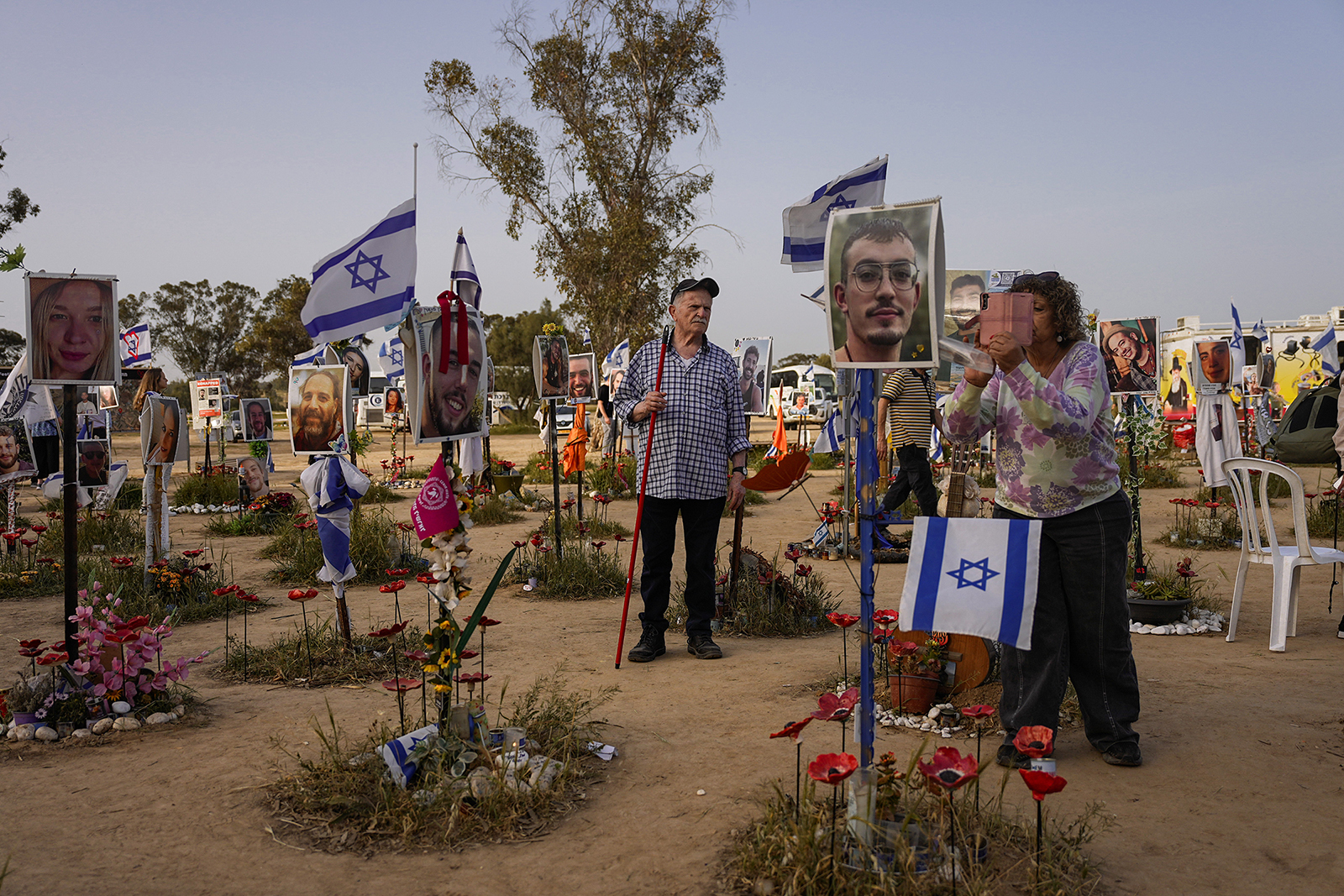
People visit the site where revelers were killed and kidnapped during the Oct. 7 cross-border attack by Hamas militants at the Nova music festival near Kibbutz Reim, southern Israel, March 27, 2024. (AP Photo/Ohad Zwigenberg)
Nachala and the broader settlement movement have adopted the pre-Israel Zionist idea that building settlements on the frontier would provide security to the heartland. Settlements inside Gaza, the thinking goes, would ensure the security of the residents of southern Israel, like those attacked on Oct. 7.
Said Avishai Bar Yehuda: “The people on the kibbutzim on the Gaza border are mostly leftists, and they actually applauded when we were expelled from our homes. They thought that would bring peace. Now I hope they understand that if we don’t settle in Gaza, all that we have suffered will have been for nothing.”
His voice breaks as he wipes away tears. “The day (IDF soldiers) came to evict me from my home was the most painful day of my life. I took nothing with me, only the mezuzot. Margalit and I got in our car and drove away, although we had no idea where we were going.
“We had built a paradise there, and it was good for the Arabs, too. We provided them with work and a higher standard of living. But for crass political reasons, the government of Israel decided to kick us out. My life has never been the same; I have been sick with many serious illnesses since then, and I am still sick. If I want to live, I have to return.”
The supporters of the Gaza resettlement movement have little doubt about what should happen to the more than 2 million people living in the Gaza Strip today. Several speakers at the January event cited the Book of Numbers: “But if ye will not drive out the inhabitants of the land from before you, then shall those that ye let remain of them be as thorns in your eyes, and as pricks in your sides, and they shall harass you in the land wherein ye dwell.”
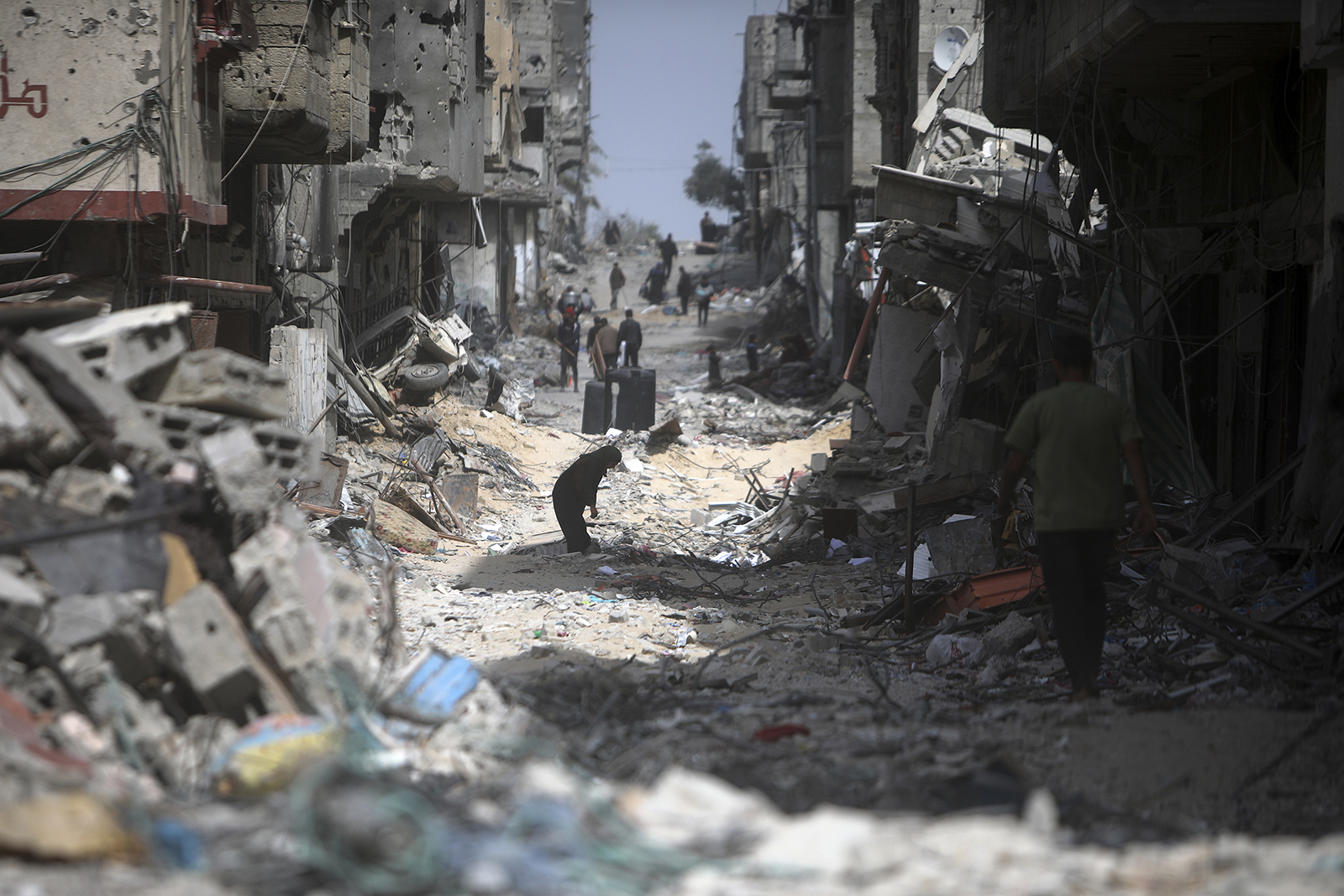
Palestinians visit their destroyed homes after Israeli forces left Khan Younis, Gaza Strip, March 6, 2024. (AP Photo/Mohammed Dahman)
Daniella Weiss, a leader of the settlement movement since its inception in the 1970s and the current head of Nachala, said she envisions Gaza as a paradise on earth, thriving with industry, agriculture and tourism, a stark contrast to the “hell” that the Palestinians have created.
“Instead of spending money to rebuild Gaza,” she said, “the nations of the world could take in the Arabs from Gaza. But no one wants to take the Gazans. I haven’t even seen the Arab nations taking them in.”
Weiss dismisses “silly talk” about the possibility of two states and peace in Gaza. “I’m not worried about the nations of the world. If we are strong, the Arabs and the nations of the world will understand that this is the way it has to be.”
Since Nachala is not officially registered as a nonprofit or nongovernmental organization in Israel, its monies are channeled through conduits. One major supporter is Americans for a Safe Israel, established, according to its website, as an American counterpart to the Land of Israel Movement, asserting Israel’s historic, religious and legal rights to the land reclaimed in the 1967 war.
In the past few months, AFSI has been particularly active, providing information, raising funds and organizing missions to Israel in support of Nachala. In February, the organization sponsored a webinar in which its supporters openly called for the expulsion of all Arabs from the Gaza Strip.
The Israeli public, however, is much less supportive. A Hebrew University poll found that 26% of Israelis favor rebuilding the settlements. Just a third of those who voted for Netanyahu’s Likud party in the last election support resettlement, and Netanyahu has said that the resettlement of Gaza is unrealistic.
Even Pinchas Wallerstein, a veteran settlement movement leader, opposes the plan. Speaking on Israeli radio, Wallerstein said: “Every struggle that divides the people gives support to our enemies and encourages them to persevere in their war. The call for settlements in the Gaza Strip at this time is tearing people apart, and at an hour when our soldiers fight and pay in blood for sovereignty for the people of Israel.”
In response to Wallerstein’s admonition, Chaya Ediger sighs. “I know that the intentions of some of the people who oppose us are pure,” she said. “But they are wrong, and they will soon come to understand.”
Indeed, the settlement movement has long ignored foreign criticism and official Israeli policy, building unauthorized settlements that later gain government approval. While they may currently be in the minority, supporters of the resettlement movement hold key positions in Netanyahu’s coalition and control his political fate.
“You’ll see,” concluded Weiss. “On Passover, 56 years ago, a tiny group of settlers came to celebrate Passover in the Park Hotel in Hebron because we believed in that the whole land of Israel must be Jewish. And today, we are nearly a million strong.”

